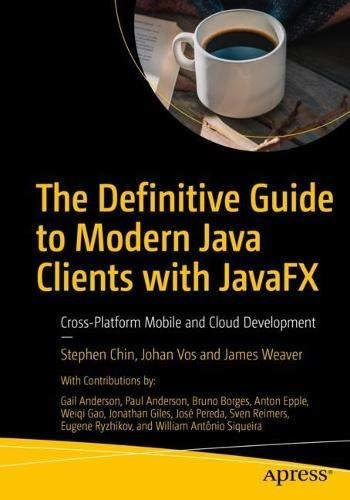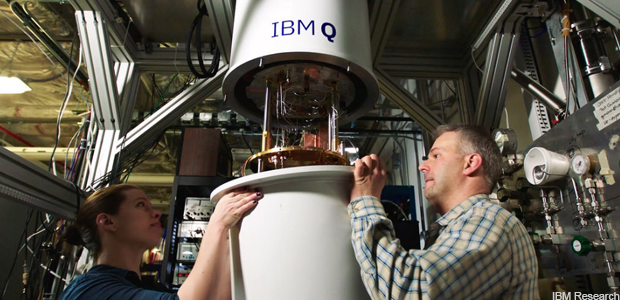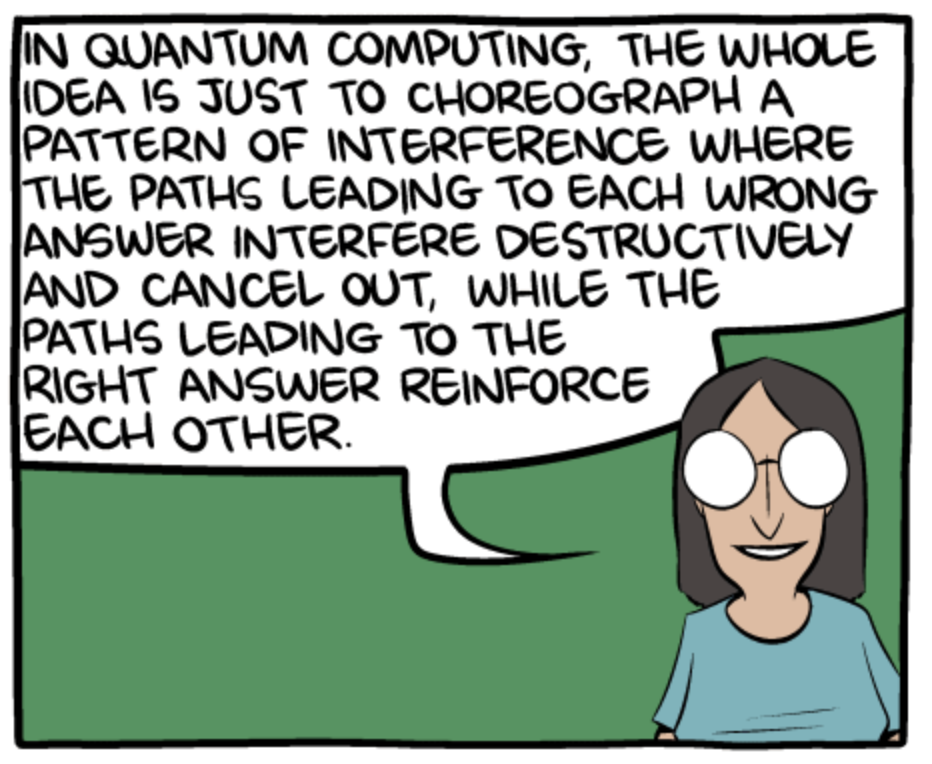Think 2019 / DOC ID / © 2019 IBM Corporation

Quantum Computing for Classical Developers
James Weaver
Quantum Developer Advocate
@JavaFXpert
slides.com/javafxpert/qc4cd
These web-based slides:
Please note
IBM’s statements regarding its plans, directions, and intent are subject to change or withdrawal without notice and at IBM’s sole discretion.
Information regarding potential future products is intended to outline our general product direction and it should not be relied on in making a purchasing decision.
The information mentioned regarding potential future products is not a commitment, promise, or legal obligation to deliver any material, code or functionality. Information about potential future products may not be incorporated into any contract.
The development, release, and timing of any future features or functionality described for our products remains at our sole discretion.
Performance is based on measurements and projections using standard IBM benchmarks in a controlled environment. The actual throughput or performance that any user will experience will vary depending upon many factors, including considerations such as the amount of multiprogramming in the user’s job stream, the I/O configuration, the storage configuration, and the workload processed. Therefore, no assurance can be given that an individual user will achieve results similar to those stated here.
Think 2019 / DOC ID / © 2019 IBM Corporation
About presenter James Weaver
IBM Quantum Developer Advocate
Java Champion
Developer / Author / Speaker
james.weaver@ibm.com






Concepts we'll address today
Introduction to quantum computing
Axioms of quantum mechanics (with cats)
- Superposition principle
- Measurement
- Unitary evolution
- Also: Entangling cats
Developing quantum computing applications
Demonstration of some quantum algorithms
Class discussion and suggestions for next steps in learning



History repeating itself
Massive hardware, limited bits, software infancy
Quantum computers make direct use of quantum-mechanical phenomena, such as superposition and entanglement, to perform operations on data.

IBM Announces Q System One at CES 2019
IBM Quantum System Two announced in 2023

Feasible on classical computers
Feasible on quantum computers
Solutions to problems
Why use a quantum computer?
Some problems may be solved exponentially faster



“Nature isn't classical, dammit, and if you want to make a simulation of nature, you'd better make it quantum mechanical, and by golly it's a wonderful problem, because it doesn't look so easy.”
Simulating nature
complex chemical reactions, for example
Dr. Richard Feynman, 1981








“If you start factoring 10-digit numbers then it’s going to start getting scary”
Breaking RSA crypto
someday maybe, using Shor's algorithm, formulated in 1994
Dr. Peter Shor, 2013

“Programming a quantum computer is particularly interesting since there are multiple things happening in the same hardware simultaneously. One needs to think like both a theoretical physicist and a computer scientist.”
Quickly searching unsorted data
using Grover's algorithm
Dr. Lov Grover, 2002


Near-term quantum computing domains

Machine Learning
Optimization
Chemistry
Finance





Concepts we'll address today
Introduction to quantum computing
Axioms of quantum mechanics (with cats)
- Superposition principle
- Measurement
- Unitary evolution
- Also: Entangling cats
Developing quantum computing applications
Demonstration of some quantum algorithms
Class discussion and suggestions for next steps in learning

Axioms of Quantum Mechanics
featuring grumpy cat (or is it grumpy ket)?



My microscopic cat is often grumpy


sometimes he is actually happy
but I've never observed him in-between those states

Axiom 1: Superposition principle

my cat can be in any combination of grumpy and happy

Representing quantum states
geometrically, ket notation, and vectors














Axiom 2: Unitary evolution
gates modeled as matrices


X
NOT gate (Pauli/X, bit-flip)

Hadamard gate
great for putting cats in equal superpositions

H
Hadamard gate



Axiom 3: Measurement
probability is amplitude squared
When observed there is a:
probability of being grumpy
probability of being happy



Multiple cats




Composite quantum states









Multiple cats
Composite quantum states













Multiple cats
Composite quantum states































Superpositions, evolution & measurement
putting the three axioms together
quantum gates
quantum gates
measure


















with 1/2 probability
with 1/6 probability
with 1/3 probability

Quantum entanglement
spooky actions at a distance

H
Hadamard gate

CNOT gate











Mars - ESA

Alice Cat
Bob Cat
Venus - NASA









1972 album by rock band known as ELP


1935 album by rock band known as EPR ;-)
Track Listing
- Spooky (Actions at a Distance)
- The Copenhagen Misinterpretation
- Hidden Variables
- Local Realism
- God Doesn't Play Dice with the Universe
- Entangled up in Blue
- Alice and Bob share a Qubit
- The Bell Inequality
- The Moon Exists (Even When I'm Not Looking)

Testing Bell's theorem:
No physical theory of local hidden variables can ever reproduce all of the predictions of quantum mechanics

Concepts we'll address today
Introduction to quantum computing
Axioms of quantum mechanics (with cats)
- Superposition principle
- Measurement
- Unitary evolution
- Also: Entangling cats
Developing quantum computing applications
Demonstration of some quantum algorithms
Class discussion and suggestions for next steps in learning


IBM Q Experience (IQX, in Beta)


IBM Q Experience measurement results


IBM Q Experience Qiskit notebooks


Qiskit open source quantum computing framework
Developing quantum apps


Qiskit Terra foundational stack
Developing quantum apps


Sample output:
{'00': 496, '11': 528}

Expresses circuit:
Minimal Qiskit example



Put your paddle into a quantum state that collapses when the ball is near
Developed at a Qiskit Camp Hackathon by Junye Huang, Anastasia Jeffery, Jarrod Reilly, and James Weaver

Example app: Quantum Pong (uses Qiskit and Pygame libraries)

Qiskit Aqua quantum algorithms
Developing quantum apps

Near-term quantum computing domains

Machine Learning
Optimization
Chemistry
Finance




Example Aqua algorithm: Grover search for boolean satisfiability

Throwing a party while avoiding the drama
What are amiable combinations of people to invite?
- Alice and Bob are in a relationship
- Carol and David are as well
- Alice and David aren't speaking
((A and B) or (C and D)) and not (A and D)

Quantum parallelism
what is it, really?


Double-slit experiment
constructive and destructive interference

Text

Choreographing interference
to increase the chance of getting the right answer
Text

Excerpts from “THE TALK” by Scott Aaronson and Zach Weinersmith



Measuring quantum state
Hitchhiker's Guide to the Galaxy analogy

Deep Thought after 7.5 million years of calculation

Example Aqua algorithm: Variational Quantum Eigensolver (VQE)

Solves combinatorial optimization problems such as Traveling Salesman (TSP)


Now it's your turn to play! Try out the self-faced workshop including guided exercises and Qiskit tutorial notebooks at learnqiskit.org
Hands-on Qiskit workshop

Notices and disclaimers
© 2018 International Business Machines Corporation. No part of this document may be reproduced or transmitted in any form without written permission from IBM.
U.S. Government Users Restricted Rights — use, duplication or disclosure restricted by GSA ADP Schedule Contract with IBM.
Information in these presentations (including information relating to products that have not yet been announced by IBM) has been reviewed for accuracy as of the date of initial publication and could include unintentional technical or typographical errors. IBM shall have no responsibility to update this information. This document is distributed “as is” without any warranty, either express or implied. In no event, shall IBM be liable for any damage arising from the use of this information, including but not limited to, loss of data, business interruption, loss of profit or loss of opportunity. IBM products and services are warranted per the terms and conditions of the agreements under which they are provided.
IBM products are manufactured from new parts or new and used parts. In some cases, a product may not be new and may have been previously installed. Regardless, our warranty terms apply.”
Any statements regarding IBM's future direction, intent or product plans are subject to change or withdrawal without notice.
Think 2019 / DOC ID / February 14, 2019 / © 2019 IBM Corporation
Performance data contained herein was generally obtained in a controlled, isolated environments. Customer examples are presented as illustrations of how those customers have used IBM products and the results they may have achieved. Actual performance, cost, savings or other results in other operating environments may vary.
References in this document to IBM products, programs, or services does not imply that IBM intends to make such products, programs or services available in all countries in which IBM operates or does business.
Workshops, sessions and associated materials may have been prepared by independent session speakers, and do not necessarily reflect the views of IBM. All materials and discussions are provided for informational purposes only, and are neither intended to, nor shall constitute legal or other guidance or advice to any individual participant or their specific situation.
It is the customer’s responsibility to insure its own compliance with legal requirements and to obtain advice of competent legal counsel as to the identification and interpretation of any relevant laws and regulatory requirements that may affect the customer’s business and any actions the customer may need to take to comply with such laws. IBM does not provide legal advice or represent or warrant that its services or products will ensure that the customer follows any law.
Notices and disclaimers continued
Information concerning non-IBM products was obtained from the suppliers of those products, their published announcements or other publicly available sources. IBM has not tested those products about this publication and cannot confirm the accuracy of performance, compatibility or any other claims related to non-IBM products. Questions on the capabilities of non-IBM products should be addressed to the suppliers of those products. IBM does not warrant the quality of any third-party products, or the ability of any such third-party products to interoperate with IBM’s products. IBM expressly disclaims all warranties, expressed or implied, including but not limited to, the implied warranties of merchantability and fitness for a purpose.
The provision of the information contained herein is not intended to, and does not, grant any right or license under any IBM patents, copyrights, trademarks or other intellectual property right.
Think 2019 / DOC ID / February 14, 2019 / © 2019 IBM Corporation
IBM, the IBM logo, ibm.com and [names of other referenced IBM products and services used in the presentation] are trademarks of International Business Machines Corporation, registered in many jurisdictions worldwide. Other product and service names might be trademarks of IBM or other companies. A current list of IBM trademarks is available on the Web at “Copyright and trademark information” at: www.ibm.com/legal/copytrade.shtml.
Think 2019 / DOC ID / February 14, 2019 / © 2019 IBM Corporation

Quantum Computing for Classical Developers
James Weaver
Quantum Developer Advocate
@JavaFXpert
Guided instruction and exercises: learnqiskit.org
Quantum Computing for Classical Developers
By javafxpert
Quantum Computing for Classical Developers
Quantum computing for classical developers presentation
- 5,916



